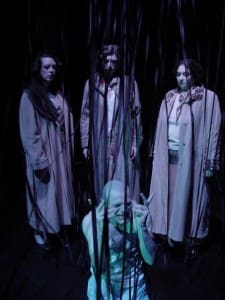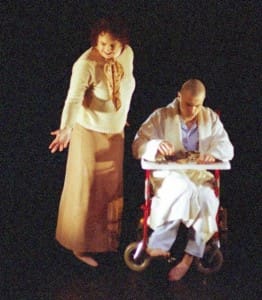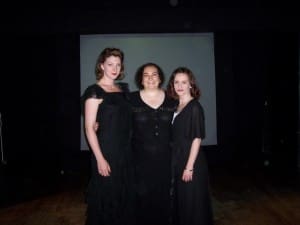- Skip to primary navigation
- Skip to secondary navigation
- Skip to main content
- Skip to primary sidebar
Good Goneril? Guest Blog by Jennifer Dick
Jennifer Dick is a Scottish actor, director and arts administrator who is probably familiar to many Bag&Baggage fans from her time in Hillsboro directing our critically acclaimed “Shakespeare’s R&J” in 2012. Jen is currently the Associate Director at Bard in the Botanics (the company founded by B&B Artistic Director under the name Glasgow Repertory Company) where she works alongside Gordon Barr, Artistic Director of BITB, on developing and producing some of the most compelling, creative and successful Shakespeare in Scotland.
Jen also has another distinctive honor: she is Scott’s favorite laboratory test subject! Jen has boldly and bravely undertaken more “new” roles for Scott than any other actor, and was often called upon to play role against type, against the grain, against gender, and against all sanity! Which she did, with impressive, compelling and truly remarkable results.
Jen played the hero Caliban in Scott’s growling, anti-Tempest, she played Enobarba (a female Enobarbus) in Antony and Cleopatra, a war-widow Mistress Quickly in Henry V, a cackling, wicked-witch-of-the-west inspired Queen Margaret in Richard III and, perhaps one of Scott’s very favorite performances in all of history, an echoing Bishop (also in Richard III). Jen is a truly remarkable talent and she brought every ounce of her skill and insight to the role of Goneril in Scott’s LEAR, in both productions, making the character one of the most heart-breaking, and truly human, characters audiences had ever seen.
Jen is currently living in Glasgow where she works (like a dog, too many hours and for too little money!) stewarding the future of Bard in the Botanics, acting and generally being an angel of goodness and light in the universe. Jen took some time to contemplate her time with Goneril in Glasgow

Good Goneril?
We had a whole lot of fun rehearsing Lear.
When you come and see the show find Scott Palmer and get him to tell you the story of ‘Poor Perdu; the Glass Glazing Panda’. Or better yet about the time when rehearsals collapsed as the blinded Perillus was accidentally walked into a door by Cordelia. No injuries were sustained but the director was laughing so hard it was impossible to continue…
I find King Lear a difficult play.
At its heart is an old, cruel man who treats those closest to him with terrible contempt and disregard and then is surprised when he is not met with love and compassion in return.
The genius of Shakespeare is to demand that love and compassion from the audience. Who can hear the King’s plea ‘Let me not be mad’ without being touched by the vulnerability of this character?
The genius of Scott Palmer is to extend that compassion to Lear’s daughters; those thankless children who abandon him to the elements.
When I was rehearsing Goneril I was, as all actors do I suppose, searching for her humanity. Purely evil characters are great fun to play but unrealistic. Goneril may act cruelly at times but the character I discovered was burdened terribly by the weight of responsibility and the lack of affection and care demonstrated towards her by her father. What became exciting to play as we worked through the story was Goneril’s own search for her humanity.

It was heartbreaking to play the scene where Goneril is attempting to care for her father at her home.
He is cruel, cold and difficult, beginning to lose his reason and taking it out on her.
She loves him but is exasperated by his weakness, his frailty.
Why can’t he just be well again?
At first Goneril allows herself to be swayed by her sister Reagan, her frustration with her father pushing her towards that ultimately unthinkable act of sending her father possibly to his death as he wanders the stormy countryside.
But Scott’s Lear allows Goneril redemption. She is pushed to the very limits of her own morality. But she finds her moral centre. She watches as her sister commits a shocking, inhuman act of violence and does nothing. She is absolutely the worst version of herself. But after that…?

I always remember how I felt when Goneril called herself a ‘milk livered woman!’ After all she has done and seen she sees herself clearly and then she acts, however dangerously, to right the wrongs she has committed. Which is a kind of redemption.
Goneril is not a moustache twirling villain, without love or compassion but a lonely, burdened child searching for herself, for her own ‘goodness’.
But I would say that. Because I played her. It’s my job to defend her. You may not agree…
And remember to ask Scott about the door and the panda. Those stories are really good.
Jennifer Dick
Glasgow, Scotland
January 24, 2014

For more information on “Bard in the Botanics” and to learn about Jen (and Scott’s!) history in Glasgow, visit the BITB website here!


Reader Interactions